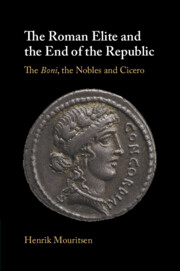Book contents
- The Roman Elite and the End of the Republic
- The Roman Elite and the End of the Republic
- Copyright page
- Contents
- Acknowledgements
- Introduction
- Part I The Boni in the Late Republic
- Part II Property and Politics
- Chapter 6 Wealth and Morality Revisited
- Chapter 7 Boni
- Chapter 8 Boni and Improbi
- Chapter 9 Otium and Tranquillitas
- Chapter 10 Vita et Bona
- Chapter 11 The Road to Perdition
- Chapter 12 ‘Egentes Sumptuosi Nobiles’
- Part III The Boni and the End of the Republic
- Appendices
- Bibliography
- Index
Chapter 6 - Wealth and Morality Revisited
from Part II - Property and Politics
Published online by Cambridge University Press: 15 December 2022
- The Roman Elite and the End of the Republic
- The Roman Elite and the End of the Republic
- Copyright page
- Contents
- Acknowledgements
- Introduction
- Part I The Boni in the Late Republic
- Part II Property and Politics
- Chapter 6 Wealth and Morality Revisited
- Chapter 7 Boni
- Chapter 8 Boni and Improbi
- Chapter 9 Otium and Tranquillitas
- Chapter 10 Vita et Bona
- Chapter 11 The Road to Perdition
- Chapter 12 ‘Egentes Sumptuosi Nobiles’
- Part III The Boni and the End of the Republic
- Appendices
- Bibliography
- Index
Summary
The Romans, or at least those of the elite, tended to associate the ownership of property with personal virtue. As we saw, the connection between wealth and morality was so entrenched that material resources could be invested with intrinsic moral worth, while, conversely, poverty acquired a close affinity to depravity and corruption. Behind this nexus we find the supposition that people of substance – at least in principle – were self-reliant and hence enjoyed a degree of personal autonomy denied those of lesser means. But since the soundness, even the existence, of the boni could be questioned, it follows that wealth alone did not qualify a person for this status. In Rome, as in any other society, the relationship between wealth and morality remained subject to ongoing negotiation which explored its internal contradictions and paradoxes. So, while the association of wealth with virtue may have been commonplace, the issue was nevertheless riddled with ambiguities. On the one hand, wealth was accepted as a fundamental benefit that enabled a person to lead a decent and upstanding life, while, on the other hand, the Romans also realised that not all the rich were good and not all the poor were necessarily bad.
- Type
- Chapter
- Information
- The Roman Elite and the End of the RepublicThe <i>Boni</i>, the Nobles and Cicero, pp. 87 - 94Publisher: Cambridge University PressPrint publication year: 2022

